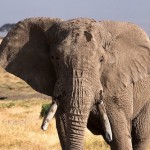Today, President of the Republic of Chad, His Excellency Idriss Déby Itno, lit the fire destroying his country’s 1.1 ton stockpile of ivory.
The destruction of the country’s ivory stockpile marks Chad’s commitment to combating the rampant elephant massacre that has destroyed the region’s once thriving elephant population. Fifty years ago, Chad was teeming with 50,000 elephants; today the total population is estimated at 1,500.
The ivory was burned at Goz Djarat, the town at the entrance to Chad’s flagship Zakouma National Park. It formed part of Zakouma National Park’s 50th anniversary event that also included the unveiling of a commemorative monument to the 23 guards slain on duty at Zakouma since 1998. The event was witnessed by a delegation of Chadian cabinet ministers, the African Parks team that manages Zakouma, representatives from other NGOs, and the media.
Last week, President Déby Itno was one of the African Heads of State who pledged support for the Elephant Protection Initiative at the UK Government’s London Conference on the Illegal Wildlife Trade.
The Elephant Protection Initiative comprises a range of measures including a commitment to cease trading in ivory products for a minimum of 10 years. The initiative’s implementing organisation, Stop Ivory, represented at today’s ivory burn, has made $2-million available to support this pledge, and the UK Government has committed $2 million. Stop Ivory is supporting elephant range states to assess and ensure ivory stockpiles are removed from commercial use, strengthen legal frameworks and assist with funding for elephant production.
Last year Chad, assisted by African Parks, launched a National Elephant Protection Plan which included the satellite collaring of individuals in seven of the country’s remaining herds. Signals are relayed real-time to a national control centre, established and managed by African Parks, under the auspices of the Chadian Ministry of Environment. The Elephant Protection Programme also includes the training of a dedicated 350 guard unit and a toll-free number to enable communities to report poaching threats.
African Parks has managed the 3 054 km² Zakouma National Park in the south east of the country since 2010 and has successfully stopped the poaching of elephants in the park, and more recently in its extended range. Not a single elephant has been lost to poaching inside Zakouma during the past two years. In addition, 21 elephant calves were sighted in the park last December, confirmation of an increase in the population and a testimony to the success of the intensive anti-poaching initiatives implemented by African Parks at Zakouma.
For further information, please contact: Communications Manager, Cynthia Walley, cynthiaw [at] african-parks [dot] org Tel: +27(0) 11 465 0050




